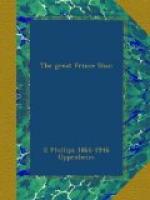“She went out of her way to make your acquaintance, then?”
“Yes, I suppose she did.”
“You know who she is?”
“The daughter of one of the Russian Consuls over here, I understood.”
“She is more than that,” Maggie declared nervously. “She is the inspiration of the President himself. She is the most vital force in Russian politics. She is the woman whom I wanted you to know, to whom I told you that I wished you to pay attentions. And now that you know her, I am afraid.”
“Where did you meet her?” he asked curiously.
“We were at school together in Paris. She was two years older than I, but she stayed there until she was twenty. Afterwards we met in Florence.”
Nigel was greatly interested.
“Somehow or other, nothing that you can tell me about her surprises me,” he admitted. “She has the air of counting for great things in the world. She is very beautiful, too.”
“She is beautiful enough,” Maggie replied, “to have turned the head of the great Paul Matinsky himself. They say that he would give his soul to be free to marry her. As it is, she is the uncrowned Tsarina of Russia.”
Nigel frowned slightly.
“Isn’t that going rather a long way?” he objected.
“Not when one remembers what manner of a man Matinsky is,” Maggie replied. “He may have his faults, but he is an absolute idealist so far as regards his private life. There has never been a word of scandal concerning him and Naida, nor will there ever be. But in his eyes, Naida has that most wonderful gift of all,—she has vision. He once told a man with whom I spoke in Berlin that Naida was the one person in the world to whom a mistake was impossible. Nigel, did she give you any idea at all what she was over here for?”
“Not as yet,” he replied, “but she has asked me to go and see her.”
“Did she seem interested in you personally, or was it because your name is Dorminster?”
Nigel sighed.
“I hoped it was a personal interest, but I cannot tell. She asked me whether I had inherited my uncle’s hobby.”
“What did you tell her?” she asked eagerly.
“Very little. She seemed sympathetic, but after all she is in the enemy camp. She and Immelan seemed on particularly good terms.”
“Yet I don’t believe that she is committed as yet,” Maggie declared. “She always used to speak so affectionately of England. Nigel, do you think that I have vision?”
“I am sure that you have,” he answered.
“Very well, then, I will tell you what I see,” she continued. “I see Naida Karetsky for Russia, Oscar Immelan for Germany, Austria and Sweden, and Prince Shan for Asia—here—meeting in London—within the next week or ten days, to take counsel together to decide whether the things which are being plotted against us to-day shall be or shall not be. Of Immelan we have no hope. He conceals it cleverly enough, but he hates England with all the fervour of a zealot. Naida is unconvinced. She is to be won. And Prince Shan—”




